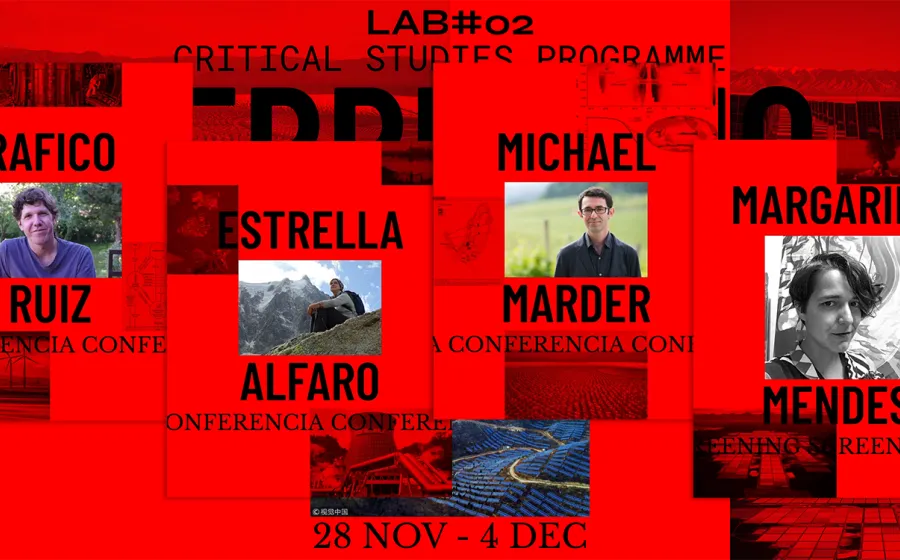TERRITORIO ECTOPLASMA: SESSION #6 Green colonialims and energy dreams
Date
Venue
Category
Format
Programme
Energy dreams, constructed on compulsive desires for productivity and profit, connect the landscapes of resource extraction with the technologies and spaces of everyday digital life. This session will address how destructive habits of extracting and consuming energy follow predictions that assume the inevitability of digital growth. In the face of climate catastrophe, we should question these predictions and embrace other forms of living rather than instigating society to find new technological or material fixes.
RAFICO RUIZ (online)
4.45 - 5.30 PM
Rafico Ruiz discusses how settler colonialism establishes itself through what he calls infrastructural mediation—the ways in which colonial lifeworlds, subjectivities, and affects come into being through the creation and maintenance of infrastructures. Ruiz expands current debates surrounding settler colonialism and extractive capitalism by focusing on Arctic infrastructures.
Rafico Ruiz is Associate Director of Research of research at the Canadian Centre for Architecture in Montreal. He pursues research on settler infrastructure building and design in the circumpolar world, with adjacent interests in post-global warming ice as a material form of political economic and cultural communication. Ruiz holds an interdisciplinary PhD in communication studies and the history and theory of architecture from McGill University. He was recently a Social Sciences and Humanities Research Council of Canada Banting Postdoctoral Fellow in the Department of Sociology at the University of Alberta. He is the author of Slow Disturbance: Infrastructural Mediation and the Promise of Extraction and the co-editor with Melody Jue of Saturation: An Elemental Politics. Ruiz was the 2018 Fulbright Canada Research Chair in Arctic studies at Dartmouth College. His work appears in the International Journal of Communication, Communication +1, and Continuum, amongst others. He is also the co-editor of the open access journal Culture Machine.
ESTRELLA ALFARO
6 - 6.30 PM
The work of Estrella Alfaro, a specialist in botany and biodiversity conservation at the University of León, makes visible and raises awareness about the installation of macro-infrastructures for energy production from renewable sources in the Cantabrian Mountains. Although she does not reject the implementation of this type of energy production systems on a small scale or for self-consumption, Alfaro warns of the impact that these parks have on biodiversity and natural resources, as well as on human and non-human populations. Alfaro also demystifies that these initiatives boost the local economy
Estrella Alfaro Saiz. The woman that whispered to forsaken plants. Professor of Botany and Curator of the LEB Herbarium of the University of León, specialising in the conservation of endangered flora and wild plants. She is a botanical science communicator with more than 15 years dedicated to promoting the values of plant biodiversity and the role of people in the care and preservation of species and refuges. Today, she is committed to reawakening the conscience of human beings to improve their relationship with their habitat and the future of plants based on ancestral knowledge and respect for the environment. The threat that the energy industry is posing to biodiversity and natural resources means that it is involved in various working groups, such as the Legal Fund for the Defence of the Cantabrian Mountains (FJDCC), the Platform for the Defence of the Cantabrian Mountains (PDCC), MEDINAT (www.medinat.es) and Luna Verde, to achieve a just transition, for humans and non-humans alike.
MARGARIDA MENDES
6.30 - 7 PM
In her film and research endeavors Margarida Mendes explores the overlap between cybernetics, philosophy, ecology, and experimental film. Her presentation focuses on the dynamic transformations of the environment and, in particular, deep sea mining as an imminent threat to global ecosystems.
Margarida Mendes is a researcher, curator and educator, exploring the overlap between systems thinking, experimental film, sound practices and ecopedagogy. She creates transdisciplinary forums, exhibitions and experiential works where alternative modes of education and sensing practices may catalyse political imagination and restorative action. Mendes has been long involved in anti-extraction activism and ecopedagogy, collaborating with marine NGOs, Universities and institutions of the art world.
MICHAEL MARDER
7.15 - 8.15 PM
The question of energy is among the most vital for the future of humanity and the flourishing of life on this planet. Yet, only very rarely (if at all) do we ask what energy is, what it means, what ends it serves, and how it is related to actuality, meaning-making, and instrumentality. In this lecture, Michael Marder focuses on the epistemology of energy from the first coinage of the word energeia by Aristotle to build a theoretical infrastructure for an alternative energy paradigm. Marder shows that, instead of being grounded in utopian naïveté, the dreams of another energy—to be procured without devastating everything in existence—derive from the suppressed concept of energy itself. Bridging phenomenology and the study of plant intelligence, Marder also analyzes the relation between vegetal networks and digital infrastructure networks.
Michael Marder is IKERBASQUE Research Professor in the Department of Philosophy at the University of the Basque Country (UPV-EHU), Vitoria-Gasteiz, Spain. His writings span the fields of ecological theory, phenomenology, and political thought. He is the author of numerous scientific articles and monographs, including, most recently, Energy Dreams (2017), Heidegger (2018), Political Categories (2019), Pyropolitics (2015, 2020); Dump Philosophy (2020); Hegel's Energy (2021); Green Mass (2021) and Philosophy for Passengers (2022), among others.
CONVERSATION WITH MICHAEL MARDER, MARGARIDA MENDES, ESTRELLA ALFARO AND MARINA OTERO
8.15 - 9 PM
Consult the other sessions here or download the programme in pdf here.
To register, click here
Free course fee

